offer句型与用法
第5课 句型和例句
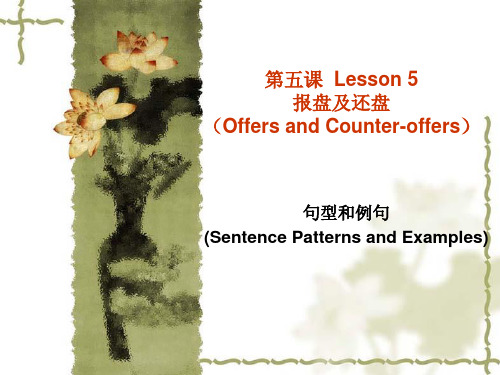
句型3:to offer as follows 报盘如下
例:谢谢你方3月18日询价,现报盘如下。 Thank you for your enquiry dated March 18 and now, we offer as follows.
句型4:to make (send, give) sb. an offer for (on) sth. 向某人报盘
例2.请报20公吨羊毛实盘,FOB悉尼价。 Please offer us firm 20 m/t tons of wool FOB Sydney.
句型2:to offer CIF (CFR, FOB) 报盘CIF (CFR, FOB)价
例1.兹报盘60吨蛋白 CFR达尔文价 We offer CFR Darwin for 60 tons Albumen. 例2.请报2000台货号437电冰箱实盘,FOB热那亚价。 Please offer firm FOB Genoa for 2000 Refrigerators Art. No.437.
句型2:to counter-offer
还盘
例:你方价格偏高,我们不得不作如下还盘,以我方在4月 8日或以前收到你方答复为有效。 Your price is on the high side and we have to counter-offer as follows, subject to your reply received by us on or before 8 April.
第五课 Lesson 5 报盘及还盘 (Offers and Counter-offers)
句型和例句 (Sentence Patterns and Examples)
高中英语固定搭配和常用短语用法归纳

高中英语词组固定搭配一、接不定式(而不接动名词)作宾语的24个常用动词afford to do sth。
负担得起做某事agree to do sth. 同意做某事arrange to do sth.安排做某事ask to do sth。
要求做某事beg to do sth。
请求做某事care to do sth。
想要做某事choose to do sth. 决定做某事decide to do sth. 决定做某事demand to do sth. 要求做某事determine to do sth。
决心做某事expect to do sth. 期待做某事fear to do sth。
害怕做某事help to do sth. 帮助做某事hope to do sth. 希望做某事learn to do sth。
学习做某事manage to do sth。
设法做某事offer to do sth. 主动提出做某事plan to do sth. 计划做某事prepare to do sth。
准备做某事pretend to do sth. 假装做某事promise to do sth. 答应做某事refuse to do sth。
拒绝做某事want to do sth. 想要做某事wish to do sth. 希望做某事注:有些不及物动词后习惯上也接不定式,不接动名词:aim to do sth. 打算做某事fail to do sth. 未能做某事long to do sth. 渴望做某事happen to do sth。
碰巧做某事hesitate to do sth. 犹豫做某事struggle to do sth. 努力做某事二、接不定式作宾补的36个常用动词advise sb。
to do sth。
建议某人做某事allow sb。
to do sth. 允许某人做某事ask sb. to do sth。
中考英语常用易混淆单词词组的区别用法详解
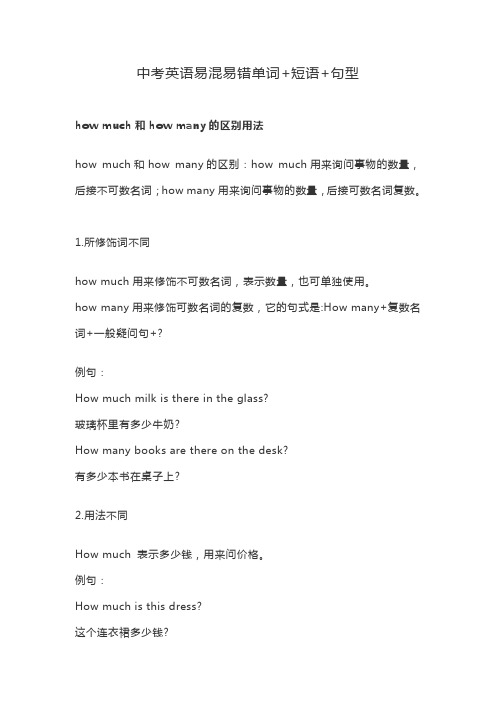
中考英语易混易错单词+短语+句型how much和how many的区别用法how much和how many的区别:how much用来询问事物的数量,后接不可数名词;how many用来询问事物的数量,后接可数名词复数。
1.所修饰词不同how much用来修饰不可数名词,表示数量,也可单独使用。
how many用来修饰可数名词的复数,它的句式是:How many+复数名词+一般疑问句+?例句:How much milk is there in the glass?玻璃杯里有多少牛奶?How many books are there on the desk?有多少本书在桌子上?2.用法不同How much 表示多少钱,用来问价格。
例句:How much is this dress?这个连衣裙多少钱?How many 表示多少,用来问数量。
例句:How many apples do you have?你有多少苹果?in和on的区别用法当我们表示某些东西被其他东西所包围时使用“in”这个词。
而“on”用于描述物体被放置在其他物体上方或外部的情况。
in可表时间,表地点,表手段、方法、材料。
on表示时间、地点、方位等。
1.意思不同in:prep.在... 里;在... 地方;在... 期间on:prep.在... 之上2.用法不同in:in着重一段时间的过程,常用于重复动作或延续动作。
in表示从现在时间算起推移到将来的一段时间之后,一般与将来时态连用。
例句:He is a layman in economics.他对经济学一窍不通。
on:表示“在物体的表面上”,只能用on的表达方式有on the next morning,on the following。
例句:The spider is walking on the ceiling.蜘蛛在天花板上爬行。
3.侧重点不同in:表示“在其中”。
on:表示“在表面”。
中考英语78个易混易错单词+短语+句型(全)
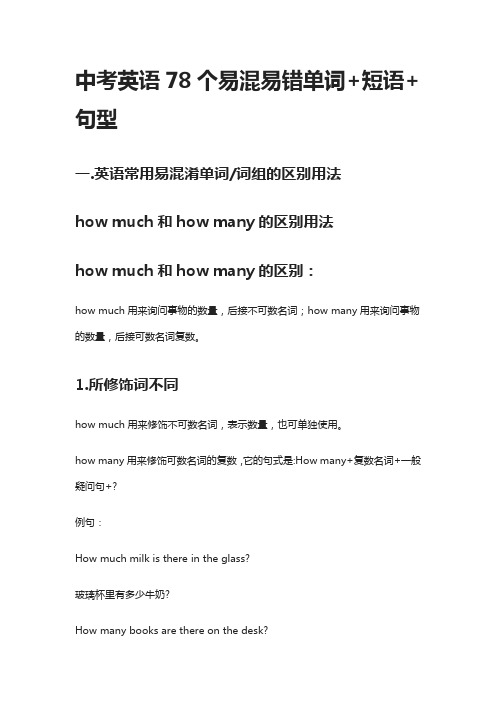
中考英语78个易混易错单词+短语+句型一.英语常用易混淆单词/词组的区别用法how much和how many的区别用法how much和how many的区别:how much用来询问事物的数量,后接不可数名词;how many用来询问事物的数量,后接可数名词复数。
1.所修饰词不同how much用来修饰不可数名词,表示数量,也可单独使用。
how many用来修饰可数名词的复数,它的句式是:How many+复数名词+一般疑问句+?例句:How much milk is there in the glass?玻璃杯里有多少牛奶?How many books are there on the desk?有多少本书在桌子上?2.用法不同How much 表示多少钱,用来问价格。
例句:How much is this dress?这个连衣裙多少钱?How many 表示多少,用来问数量。
例句:How many apples do you have?你有多少苹果?in和on的区别用法:当我们表示某些东西被其他东西所包围时使用“in”这个词。
而“on”用于描述物体被放置在其他物体上方或外部的情况。
in可表时间,表地点,表手段、方法、材料。
on表示时间、地点、方位等。
1.意思不同in:prep.在 ... 里;在 ... 地方;在 ... 期间on:prep.在 ... 之上2.用法不同in:in着重一段时间的过程,常用于重复动作或延续动作。
in表示从现在时间算起推移到将来的一段时间之后,一般与将来时态连用。
He is a layman in economics.他对经济学一窍不通。
on:表示“在物体的表面上”,只能用on的表达方式有on the next morning,on the following。
The spider is walking on the ceiling.蜘蛛在天花板上爬行。
3.侧重点不同in:表示“在其中”。
牛津英语9AUnitUnit3单词短语重难点解析
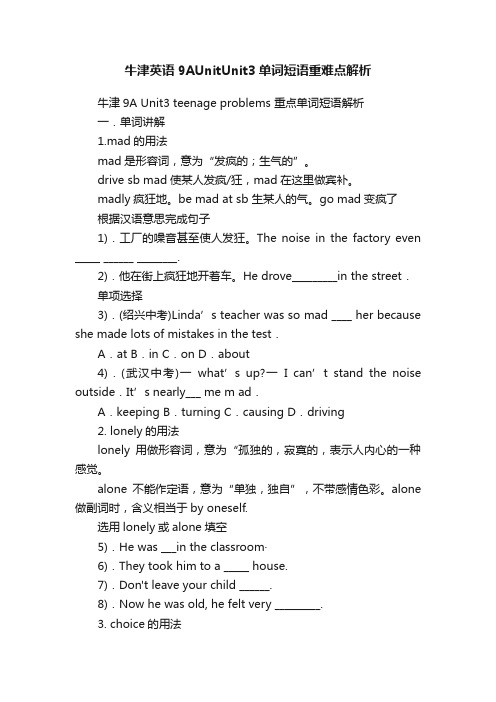
牛津英语9AUnitUnit3单词短语重难点解析牛津9A Unit3 teenage problems 重点单词短语解析一.单词讲解1.mad的用法mad是形容词,意为“发疯的;生气的”。
drive sb mad使某人发疯/狂,mad在这里做宾补。
madly疯狂地。
be mad at sb 生某人的气。
go mad变疯了根据汉语意思完成句子1).工厂的噪音甚至使人发狂。
The noise in the factory even _____ ______ ________.2).他在街上疯狂地开着车。
He drove_________in the street.单项选择3).(绍兴中考)Linda’s teacher was so mad ____ her because she made lots of mistakes in the test.A.at B.in C.on D.about4).(武汉中考)一what’s up?一I c an’t stand the noise outside.It’s nearly___ me m ad.A.keeping B.turning C.causing D.driving2. lonely的用法lonely用做形容词,意为“孤独的,寂寞的,表示人内心的一种感觉。
alone不能作定语,意为“单独,独自”,不带感情色彩。
alone 做副词时,含义相当于by oneself.选用lonely或alone填空5).He was ___in the classroom·6).They took him to a _____ house.7).Don't leave your child ______.8).Now he was old, he felt very _________.3. choice的用法choice是名词,意为“选择,挑选”,have no choice but to…意为“别无选择,只能……”。
offer句型与用法

一、offer句型(一)做动词句型1、offer sth (主动)给某物2、offer sb sth =offer sth to sb (主动)给某人某物3、offer to do sth (主动)提出/愿意做某事4、offer sth for (money) 以多少钱出售某物5、offer sb (money) for sth / to buy sth 出价多少购买某物(二)做名词句型1、Make an offer to doMake an offer of 主动提出做…..2、accept an offer to do(of)……接受……的建议二、offer作动词的用法:1. offer有"(主动)拿给,给予"的意思,相当于give, 后可接名词或代词作宾语(offer sth),也可接双宾语,即offer sb sth =offer sth to sb, 如:The young man offered the old man his own seat on the bus.那个年轻人在公共汽车上将自己的座位让给了那个老人。
Many people willingly offered their blood.很多人自愿献血。
No food was offered at the party.聚会时没有提供食品。
2. offer作"提出、表示"解。
(offer sth)如:Johnson offered a new suggestion.约翰逊提出了一个新建议。
We all went to offer congratulations.我们都前去表示祝贺。
The boss in the company came personally to offer us apologies.那个公司的老板亲自来向我们道歉。
The president offered no comment on the question.总统对这个问题未作评论。
简单句的五种基本句型
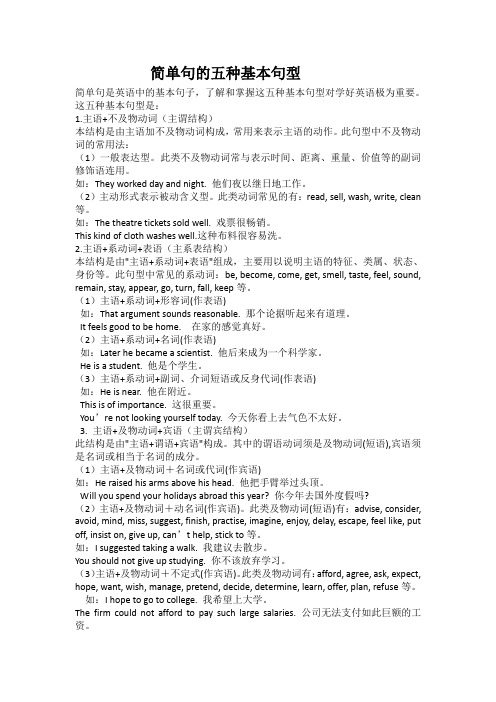
简单句的五种基本句型简单句是英语中的基本句子,了解和掌握这五种基本句型对学好英语极为重要。
这五种基本句型是:1.主语+不及物动词(主谓结构)本结构是由主语加不及物动词构成,常用来表示主语的动作。
此句型中不及物动词的常用法:(1)一般表达型。
此类不及物动词常与表示时间、距离、重量、价值等的副词修饰语连用。
如:They worked day and night. 他们夜以继日地工作。
(2)主动形式表示被动含义型。
此类动词常见的有:read, sell, wash, write, clean 等。
如:The theatre tickets sold well. 戏票很畅销。
This kind of cloth washes well.这种布料很容易洗。
2.主语+系动词+表语(主系表结构)本结构是由"主语+系动词+表语"组成,主要用以说明主语的特征、类属、状态、身份等。
此句型中常见的系动词:be, become, come, get, smell, taste, feel, sound, remain, stay, appear, go, turn, fall, keep等。
(1)主语+系动词+形容词(作表语)如:That argument sounds reasonable. 那个论据听起来有道理。
It feels good to be home.在家的感觉真好。
(2)主语+系动词+名词(作表语)如:Later he became a scientist. 他后来成为一个科学家。
He is a student. 他是个学生。
(3)主语+系动词+副词、介词短语或反身代词(作表语)如:He is near. 他在附近。
This is of importance. 这很重要。
You’re not looking yourself today. 今天你看上去气色不太好。
3. 主语+及物动词+宾语(主谓宾结构)此结构是由"主语+谓语+宾语"构成。
人教部编版初中英语中考78个易混易错单词短语句型梳理
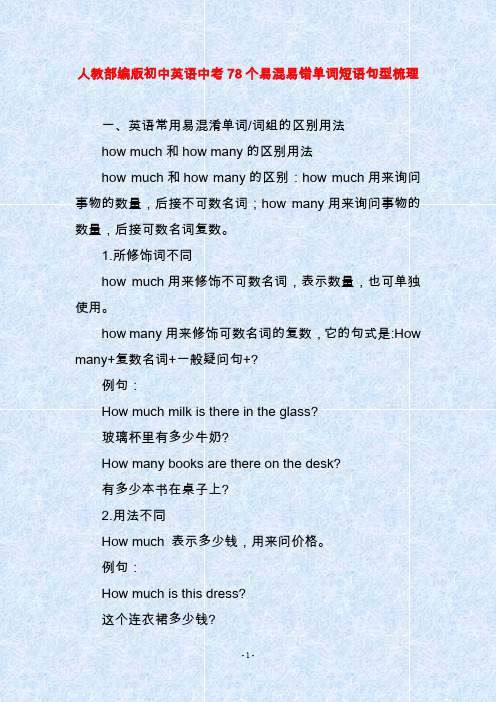
人教部编版初中英语中考78个易混易错单词短语句型梳理一、英语常用易混淆单词/词组的区别用法how much和how many的区别用法how much和how many的区别:how much用来询问事物的数量,后接不可数名词;how many用来询问事物的数量,后接可数名词复数。
1.所修饰词不同how much用来修饰不可数名词,表示数量,也可单独使用。
how many用来修饰可数名词的复数,它的句式是:How many+复数名词+一般疑问句+?例句:How much milk is there in the glass?玻璃杯里有多少牛奶?How many books are there on the desk?有多少本书在桌子上?2.用法不同How much 表示多少钱,用来问价格。
例句:How much is this dress?这个连衣裙多少钱?How many 表示多少,用来问数量。
例句:How many apples do you have?你有多少苹果?in和on的区别用法当我们表示某些东西被其他东西所包围时使用“in”这个词。
而“on”用于描述物体被放置在其他物体上方或外部的情况。
in可表时间,表地点,表手段、方法、材料。
on表示时间、地点、方位等。
1.意思不同in:prep.在 ... 里;在 ... 地方;在 ... 期间on:prep.在 ... 之上2.用法不同in:in着重一段时间的过程,常用于重复动作或延续动作。
in表示从现在时间算起推移到将来的一段时间之后,一般与将来时态连用。
例句:He is a layman in economics.他对经济学一窍不通。
on:表示“在物体的表面上”,只能用on的表达方式有on the next morning,on the following。
例句:The spider is walking on the ceiling.蜘蛛在天花板上爬行。
offer实用句型

外贸英语学习—报盘和还盘 Offer & Counter-Offer(一)We have the offer ready for you. 我们已经为你准备好报盘了。
I come to hear about your offer for fertilizers. 我来听听你们有关化肥的报盘。
Please make us a cable offer. 请来电报盘。
Please make an offer for the bamboo shoots of the quality as that in the last contract. 请把上次合同中订的那种质量的竹笋向我们报个价。
We are in a position to offer tea from stock. 我们现在可以报茶叶现货。
We'll try our best to get a bid from the buyers. 我们一定尽力获得买主的递价。
We'll let you have the official offer next Monday. 下星期就给您正式报盘。
I'm waiting for your offer. 我正等您的报价。
We can offer you a quotation based upon the international market. 我们可以按国际市场价格给您报价。
We have accepted your firm offer. 我们已收到了你们报的实盘。
We offer firm for reply 11 a.m. tomorrow. 我们报实盘,以明天上午11点答复为有效。
We'll let you have our firm offer next Sunday. 下星期天我们就向你们发实盘。
We're willing to make you a firm offer at this price. 我们愿意以此价格为你报实盘。
英语五种基本句型

英语的五种基本句型1. Subject (主语) +Verb (谓语)这种句型中的动词大多是不及物动词,这些动词常见的有:appear, apologize,arrive, come, die, disappear, exist, fall, happen, rise,等等。
如:The students work very hard.学生们学习很努力。
She apologized to me again. 她再次向我道歉。
The accident happened yesterday evening.事故是昨天晚上发生的。
2. Subject (主语) +Link. V(系动词) +Predicate(表语)这种句型中的系动词一般可分为下列两类:(1)表示状态的连系动词。
这些词有:be, look, seem, appear, smell, taste, sound, keep, remain, 等等。
如:Several players lay flat on the playground.几个队员平躺在操场上。
We should remain modest and prudent any time.我们在任何时候都应该保持谦虚谨慎。
This kind of food tastes terrible.这种食物吃起来很糟糕。
The picture looks more beautiful at a certain distance.这幅画在一定的距离看更漂亮一些。
(2)表示转变或结果的系动词。
这些词有:become, get, grow, turn, go, come, prove,等等。
如:Spring comes. It is getting warmer and warmer.春天到了,天气变得越来越暖和。
Don't have the food. It has gone bad.不要吃那种食物,已经变质了。
Offer Letter:简单又复杂(推荐6篇)
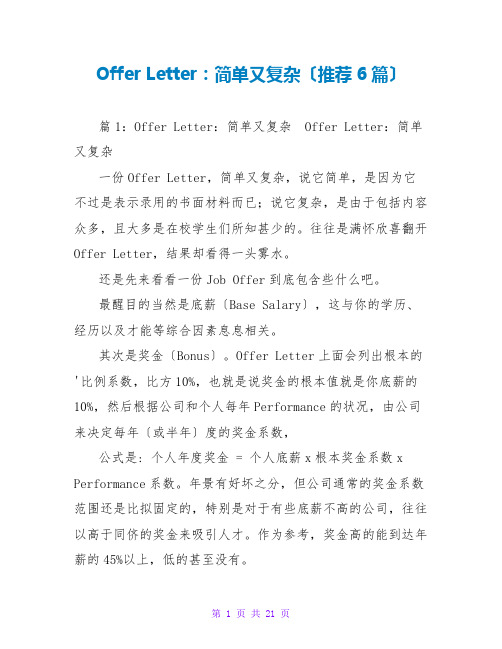
Offer Letter:简单又复杂〔推荐6篇〕篇1:Offer Letter:简单又复杂 Offer Letter:简单又复杂一份Offer Letter,简单又复杂,说它简单,是因为它不过是表示录用的书面材料而已;说它复杂,是由于包括内容众多,且大多是在校学生们所知甚少的。
往往是满怀欣喜翻开Offer Letter,结果却看得一头雾水。
还是先来看看一份Job Offer到底包含些什么吧。
最醒目的当然是底薪〔Base Salary〕,这与你的学历、经历以及才能等综合因素息息相关。
其次是奖金〔Bonus〕。
Offer Letter上面会列出根本的'比例系数,比方10%,也就是说奖金的根本值就是你底薪的10%,然后根据公司和个人每年Performance的状况,由公司来决定每年〔或半年〕度的奖金系数,公式是: 个人年度奖金 = 个人底薪x根本奖金系数x Performance系数。
年景有好坏之分,但公司通常的奖金系数范围还是比拟固定的,特别是对于有些底薪不高的公司,往往以高于同侪的奖金来吸引人才。
作为参考,奖金高的能到达年薪的45%以上,低的甚至没有。
然后是签约奖金〔Sign-on Bonus〕,也就是一次性的奖金,通常在签约后一个月左右发放,数量从几千到数万美元不等。
需要说明的是,这种签约奖金一般都是有年限规定的,也就是签约者必须在该公司工作满一定的时间,比方一年或两年。
假如不到期满就另择他就的话,那么需要根据剩下时间段所占的比例来退还给公司。
接下来是股票,这里面又包括好几类。
篇2:那些简单又复杂的句型那些简单又复杂的句型EX:It took me a while to lose weight.( 我花了一段时间来减肥。
)EX:It took him a month to finish his novel.( 他花了一个月完成他的小说。
)EX: I spent a while losing weight.( 我花了一段时间来减肥。
高考英语重点词汇复习之四
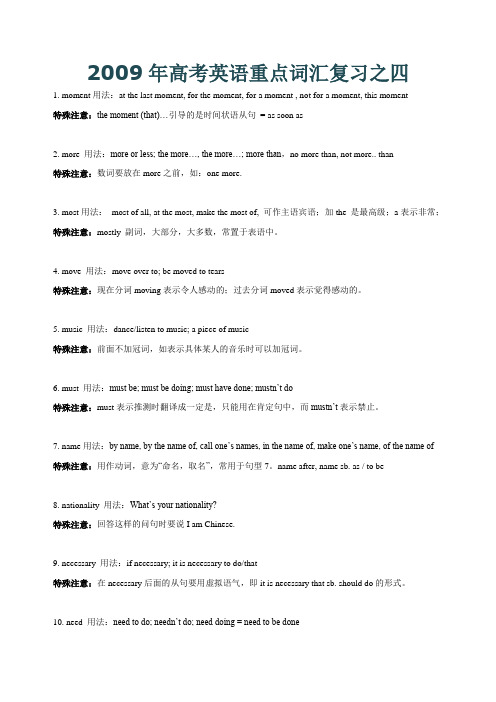
2009年高考英语重点词汇复习之四1. moment用法:at the last moment, for the moment, for a moment , not for a moment, this moment特殊注意:the moment (that)…引导的是时间状语从句= as soon as2. more 用法:more or less; the more…, the more…; more than,no more than, not more.. than特殊注意:数词要放在more之前,如:one more.3. most用法:most of all, at the most, make the most of, 可作主语宾语;加the 是最高级;a表示非常;特殊注意:mostly 副词,大部分,大多数,常置于表语中。
4. move 用法:move over to; be moved to tears特殊注意:现在分词moving表示令人感动的;过去分词moved表示觉得感动的。
5. music 用法:dance/listen to music; a piece of music特殊注意:前面不加冠词,如表示具体某人的音乐时可以加冠词。
6. must 用法:must be; must be doing; must have done; mustn’t do特殊注意:must表示推测时翻译成一定是,只能用在肯定句中,而mustn’t表示禁止。
7. name用法:by name, by the name of, call one’s names, in the name of, make one’s name, of the name of特殊注意:用作动词,意为“命名,取名”,常用于句型7。
name after, name sb. as / to be8. nationality 用法:What’s your nationality?特殊注意:回答这样的问句时要说I am Chinese.9. necessary 用法:if necessary; it is necessary to do/that特殊注意:在necessary后面的从句要用虚拟语气,即it is necessary that sb. should do的形式。
英语动词的运用与基本句型
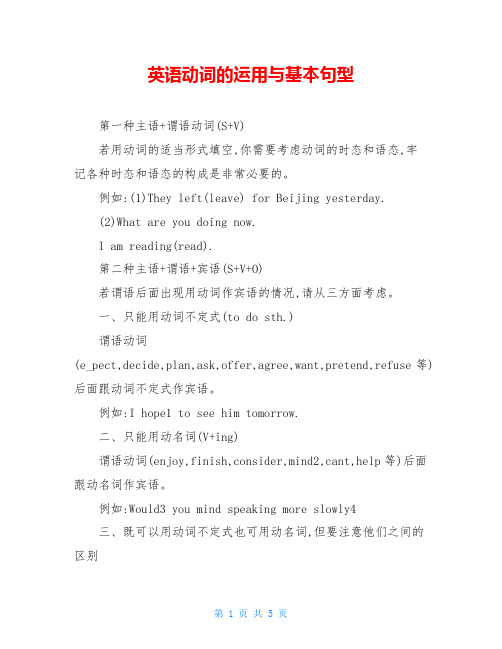
英语动词的运用与基本句型第一种主语+谓语动词(S+V)若用动词的适当形式填空,你需要考虑动词的时态和语态,牢记各种时态和语态的构成是非常必要的。
例如:(1)They left(leave) for Beijing yesterday.(2)What are you doing now.I am reading(read).第二种主语+谓语+宾语(S+V+O)若谓语后面出现用动词作宾语的情况,请从三方面考虑。
一、只能用动词不定式(to do sth.)谓语动词(e_pect,decide,plan,ask,offer,agree,want,pretend,refuse等)后面跟动词不定式作宾语。
例如:I hope1 to see him tomorrow.二、只能用动名词(V+ing)谓语动词(enjoy,finish,consider,mind2,cant,help等)后面跟动名词作宾语。
例如:Would3 you mind speaking more slowly4三、既可以用动词不定式也可用动名词,但要注意他们之间的区别谓语动词(like,hate,remember,forget,try等)后面两种形式都可以。
例如:I forget meeting5 him somewhere6.(曾做过)I forgot7 to post the etter.(未曾做过)第三种主语+谓语+宾语+宾补(S+V+O+OC)动词不定式有to或动词不定式省略to或V.+ing这三种形式都可以作宾补。
用哪一种形式由谓语动词决定。
(1)谓语动词(ask,tell,allow8,advise,invite,want,like,e_pect,order,war n,encourage等)后面用动词不定式有to的形式作宾补。
例如:His mother allow sher to go out on Sunday.(2)谓语动词keep后面用动词作宾补,只能用v.+ing形式。
七年级 上册U4HavingFun句式精讲精练
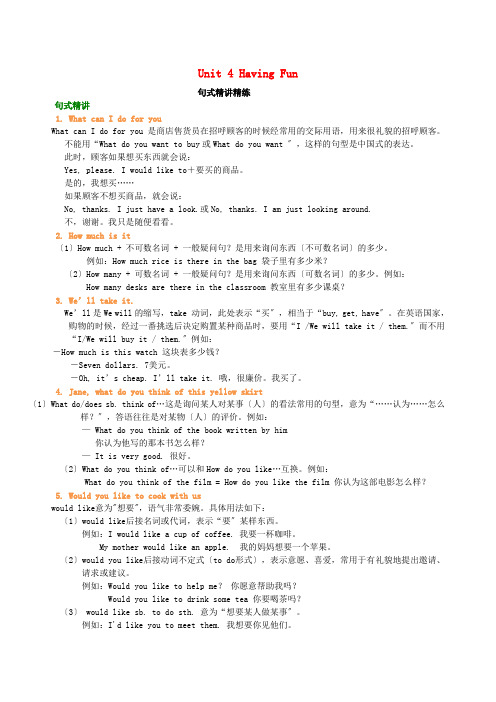
Unit 4 Having Fun句式精讲精练句式精讲1. What can I do for youWhat can I do for you 是商店售货员在招呼顾客的时候经常用的交际用语,用来很礼貌的招呼顾客。
不能用“What do you want to buy或What do you want 〞,这样的句型是中国式的表达。
此时,顾客如果想买东西就会说:Yes, please. I would like to+要买的商品。
是的,我想买……如果顾客不想买商品,就会说:No, thanks. I just have a look.或No, thanks. I am just looking around.不,谢谢。
我只是随便看看。
2. How much is it〔1〕How much + 不可数名词 + 一般疑问句?是用来询问东西〔不可数名词〕的多少。
例如:How much rice is there in the bag 袋子里有多少米?〔2〕How many + 可数名词 + 一般疑问句?是用来询问东西〔可数名词〕的多少。
例如: How many desks are there in the classroom 教室里有多少课桌?3. We’ll take it.We’ll是We will的缩写,take 动词,此处表示“买〞,相当于“buy, get, have〞。
在英语国家,购物的时候,经过一番挑选后决定购置某种商品时,要用“I /We will take it / them.〞而不用“I/We will buy it / them.〞例如:-How much is this watch 这块表多少钱?-Seven dollars. 7美元。
-Oh, it’s cheap. I’ll take it. 哦,很廉价。
我买了。
4. Jane, what do you think of this yellow skirt〔1〕What do/does sb. think of…这是询问某人对某事〔人〕的看法常用的句型,意为“……认为……怎么样?〞,答语往往是对某物〔人〕的评价。
初中英语八下Unit4 单词知识梳理词汇句式精讲

初中英语八下Unit4 单词知识梳理词汇句式精讲Unit 4单词(音标)allow [əˈlaʊ] v. 允许,准许wrong [rɔŋ] adj. 错误的What's wrong? 哪儿不舒服?midnight ['mɪdnaɪt] n. 午夜,子夜look through 浏览,快速查看guess [ɡes] v. 猜测,估计deal [di:l] v. 处理,应付big deal 重要的事work out 成功地发展,解决get on with 和睦相处,关系良好relation [rɪˈleɪʃn] n. 关系,联系,交往communicate [kəˈmju:nikeit] v. 沟通,通信,通讯communication [kəˌmju:nɪˈkeɪʃn] n. 交流,沟通argue [ˈɑ:ɡju:] v. 争论,争吵cloud [klaʊd] n. 云elder ['eldə(r)] adj. 年级较长的instead [ɪnˈsted] adv. 代替whatever [wɒtˈevər] pron. 任何,不管什么,无论什么nervou s [ˈnə:vəs] adj. 紧张不安的offer ['a:fər] v. 提供,自愿给予proper [ˈprɔpə] adj. 合适的,适当的secondly [ˈsekəndli] adv. 第二,其次explain [ɪkˈspleɪn] v. 讲解,解释,说明clear [klɪə] adj. 清晰的,清楚易懂的copy [ˈkɔpi] v. 复制return [rɪ'tɜ:n] v. 回来,返回,归还anymore ['enɪmɔ:] adv. 不再,再也不member [ˈmembə] n. 成员,会员pressure ['preʃə(r)] n. 压力compete [kəm'pi:t] v. 比赛,竞争opinion [əˈpɪnjən] n. 意见,想法,看法skill [skɪl] n. 技能,技巧typical [ˈtɪpɪkl] adj. 典型的football [ˈfʊtbɔ:l] n. 足球cut out 删去,删除quick [kwɪk] adj. 快的,迅速的continue [kənˈtɪnju:] v. 继续,连续compare [kəm'peə] v. 比较compare…with 比较,对比crazy [ˈkreɪzɪ] adj. 疯狂的,狂热的development [diˈveləpmənt] n. 发育,成长,发展cause [kɔ:z] n. & v. 原因;造成,使发生usual [ˈju:ʒuəl] adj. 通常的,平常的in one's opinion 依…看perhaps [pəˈhæps] adv. 可能,大概,也许Unit4 知识梳理【重点单词】1.have free time有空闲时间2.allow sb. to do sth. 允许某人做某事3.hang out with sb. 与某人闲逛4. after-school classes课外活动课5. get into a fight with sb.与某人吵架/打架6. until midnight直到半夜7. talk to sb. 与某人交谈8. too many太多9. study too much学得过多10. get enough sleep有足够的睡眠11. write sb. a letter给某人写信12. call sb. up打电话给某人13. surprise sb. 令某人惊讶14. look through翻看15. be angry with sb. 生某人的气16. a big deal重要的事17. work out成功地发展;解决18. get on with与...相处19. fight a lot经常吵架/打架20. hang over笼罩21. refuse to do sth. 拒绝做某事22. offer to do sth. 主动提出做某事23. so that以便24. mind sb. doing sth. 介意某人做某事25. all the time一直26. in future今后27. make sb. angry使某人生气28. worry about sth. 担心某事29. copy one’s homework抄袭某人的作业30. be oneself做自己31. family members32. spend time alone独自消磨时光33. give sb. pressure给某人施压34. have a fight with sb. 与某人吵架35. compete with sb. 与某人竞争36. free time activities业余活动37. get better grades取得更好的成绩38. give one’s opinion提出某人的观点39. learn exam skills学习应试技巧40. practice sports体育训练41. cause stress造成压力42. cut out删除【重点句型】1. I studied until midnight last night so I didn't get enough sleep. 我昨晚学习到半夜所以睡眠不足。
简单句的五种基本句型

英语的五种基本句型训练1.主语+系动词+表语这种句型中的系动词一般可分为下列两类:(1)表示状态的连系动词。
这些词有:be, look, seem, appear, smell, taste, soun d, sit, stand, lie, keep, remain, stay,等等。
(2)表示转变或结果的系动词。
这些词有:become, get, grow, turn, go, come, prove,等等.(3)形容词,名词,现在分词,过去分词,不定式,介词都可以放在某些连系动词后做表语。
(1)他是一个运动员。
He is an athlete.(2)长大后他成为一位老师。
He turned/became a teacher when he grew up.(3)这种食物吃起来很糟糕。
The food tastes terrible.(5)那种食物已经变质了。
The food has turned bad.(6) 地上躺着一个人。
A man lies on the ground.(7)这消息听起来挺鼓舞人心的。
The news sounds quite exciting.(8) 我们对那个结果很满意。
We are satisfied with the result.(9)我的愿望是成为一位作家。
My ambition is to be a writer.(10)我最喜欢的消遣是踢足球。
My favorite pastime is playing football.2.主语+谓语(1)这种句型中的动词大多是不及物动词,这些动词常见的有:take place, happen, break out, appear, disappear, apologize, arrive, come, die, exist, fall, rise, hang(可作及物动词或不及物动词)等等。
(2)有些动词如wash, sell, burn,write, clean, draw, cook, read等等可以在后面加副词表示主语的性质。
offer句型与用法

一、 offer 句型(一)做动词句型1、offer sth (主动)给某物2、offer sb sth =offer sth to sb (主动)给某人某物3、offer to do sth (主动)提出/愿意做某事4、offer sth for (money)以多少钱出售某物5、offer sb (money) for sth / to buy sth 出价多少购买某物(二)做名词句型1、Make an offer to doMake an offer of 主动提出做…..2、accept an offer to do (of)接受.... 的建议二、 offer 作动词的用法 :1. offer 有"(主动)拿给,给予"的意思 ,相当于 give, 后可接名词或代词作宾语(offersth),也可接双宾语,即 offer sb sth =offer sth to sb, 如:The young man offered the old man his own seat on the bus. 那个年轻人在公共汽车上将自己的座位让给了那个老人。
Many people willingly offered their blood.很多人自愿献血。
No food was offered at the party.聚会时没有提供食品。
2. offer 作"提出、表示"解。
(offer sth)如:Johnson offered a new suggestion.约翰逊提出了一个新建议。
We all went to offer congratulations.我们都前去表示祝贺。
The boss in the company came personally to offer us apologies. 那个公司的老板亲自来向我们道歉。
The president offered no comment on the question. 总统对这个问题未作评论。
offer句型与用法

一、offer句型(一)做动词句型1、offer sth (主动)给某物2、offer sb sth =offer sth to sb (主动)给某人某物3、offer to do sth (主动)提出/愿意做某事4、offer sth for (money) 以多少钱出售某物5、offer sb (money) for sth / to buy sth 出价多少购买某物(二)做名词句型1、Make an offer to doMake an offer of 主动提出做…..2、accept an offer to do(of)……接受……的建议二、offer作动词的用法:1. offer有"(主动)拿给,给予"的意思,相当于give, 后可接名词或代词作宾语(offer sth),也可接双宾语,即offer sb sth =offer sth to sb, 如:The young man offered the old man his own seat on the bus.那个年轻人在公共汽车上将自己的座位让给了那个老人。
Many people willingly offered their blood.很多人自愿献血。
No food was offered at the party.聚会时没有提供食品。
2. offer作"提出、表示"解。
(offer sth)如:Johnson offered a new suggestion.约翰逊提出了一个新建议。
We all went to offer congratulations.我们都前去表示祝贺。
The boss in the company came personally to offer us apologies.那个公司的老板亲自来向我们道歉。
The president offered no comment on the question.总统对这个问题未作评论。
offer什么意思-释义&用法解析及例句

offer什么意思-释义&用法解析及例句offer发音英['ɒfə(r)] 美['ɔːfər]vt.提供;提出;(卖方)出价;贡献vi.提议;出现;求婚n.提议;出价详尽释义n.(名词)给予(物),提供(物),提议【商】发价,发盘,报价,开价企图,努力,意图的表示求婚【律】要约录用v.(动词)(主动)给予,提供,拿出,出示(主动表示)愿意做某事,提议提出作出试图做(某事),威胁出(价),开(价),备有...出售奉献,贡献呈现出,(使)出现演出求婚献祭<古>试图释义补充:录取通知offer,全称是offer letter,汉语解释为录用信、录取通知。
所谓offer letter,还没一个统一的名字,有人称之为“录取通知”,有人谓之“录用信”,也有人称为“要约函”。
以前一般是说外企或国外学校发的表达自己愿意录用的一封格式类似的信件,后来很多人都把自己接到公司的“offer letter”,电话通知等一类的叫offer,被公司通知面试合格能够录用就说收到了offer,而真正发offer letter的也只是很正规的大企业。
此外,也有人说offer是“录取通知书加全额奖学金”。
offer,全称是offer letter,汉语解释为录用信、录取通知。
所谓offer letter,还没一个统一的名字,有人称之为“录取通知”,有人谓之“录用信”,也有人称为“要约函”。
以前一般是说外企或国外学校发的表达自己愿意录用的一封格式类似的信件,后来很多人都把自己接到公司的“offer letter”,电话通知等一类的叫offer,被公司通知面试合格能够录用就说收到了offer,而真正发offer letter的也只是很正规的大企业。
同义词v.(动词)advance afford bid extend furnish propose provide show submit suggest tender volunteer 反义词v.(动词)decline refuse reject词义辨析v.(动词)offer, give这两个词均可表示“给”。
国际贸易Enquiry,offer,counter-offerand acceptance

向客户进行询盘1. 文体介绍在对外贸易中,询盘,也叫询价(inquiry或enquiry)是买方或买方对于所要购买或出售的商品向另一方作出的询问。
询盘是交易的起点,可以分为:普通询盘(a general inquiry):索取普通资料,诸如:目录(a catalogue)、价目表或报价单(a price-list or quotation sheets)、样品(a sample)、图片(illustrated photo prints)等。
具体询盘(a specific inquiry): 具体询问商品名称(the name of the commodity)、规格(the specifications)、数量(the quantity)、单价(the unit price FOB…CIF…),装船期(the time of shipment)、付款方式(the terms of payment)等。
询盘一般多为买方向卖方发出,买方通过询盘信,简明扼要的向卖方了解一般的商品信息。
利用E-mail 写询盘信,无须写的过分客气,只需具体、简洁、措词得体。
有的询盘信开门见山,直截了当说明订购打算,希望对方给予一定优惠条件;有的询盘信则以征询信息的方式,不许下订货诺言,以避免结果未订购可能形成的日后交易中的障碍。
2.实用范例Subject: EnquiryDear Sir,We are interested in buying large quantities of steel screws in all sizes.We would be obliged if you would give us a quotation per kilogram C&F Liverpool, England. It would also be appreciated if you could forward samples and your price-list to us.We used to purchase these products from other sources. We may now prefer to buy from your company because we understand that you are able to supply larger quantities at more attractive prices. In addition, we have confidence in the quality of your products.We look forward to hearing from you by return E-mail.Sincerely,Xxx3、参考译文主题:询盘亲爱的先生:本公司有意大量购买各型号钢螺钉,欲知每公斤运抵英国利物浦的成本价运费价格。
- 1、下载文档前请自行甄别文档内容的完整性,平台不提供额外的编辑、内容补充、找答案等附加服务。
- 2、"仅部分预览"的文档,不可在线预览部分如存在完整性等问题,可反馈申请退款(可完整预览的文档不适用该条件!)。
- 3、如文档侵犯您的权益,请联系客服反馈,我们会尽快为您处理(人工客服工作时间:9:00-18:30)。
一、offer句型
(一)做动词句型
1、offer sth (主动)给某物
2、offer sb sth =offer sth to sb (主动)给某人某物
3、offer to do sth (主动)提出/愿意做某事
4、offer sth for (money) 以多少钱出售某物
5、offer sb (money) for sth / to buy sth 出价多少购买某物
(二)做名词句型
1、Make an offer to do
Make an offer of 主动提出做…..
2、accept an offer to do(of)……接受……的建议
二、offer作动词的用法:
1. offer有"(主动)拿给,给予"的意思,相当于give, 后可接名词或代词作宾语(offer sth),也可接双宾语,即offer sb sth =offer sth to sb, 如:
The young man offered the old man his own seat on the bus.
那个年轻人在公共汽车上将自己的座位让给了那个老人。
Many people willingly offered their blood.
很多人自愿献血。
No food was offered at the party.
聚会时没有提供食品。
2. offer作"提出、表示"解。
(offer sth)如:
Johnson offered a new suggestion.
约翰逊提出了一个新建议。
We all went to offer congratulations.
我们都前去表示祝贺。
The boss in the company came personally to offer us apologies.
那个公司的老板亲自来向我们道歉。
The president offered no comment on the question.
总统对这个问题未作评论。
3. offer后接不定式,表示"主动提出做某事"。
如:
He offered to drive us to the airport, but we preferred to walk there. 他主动提出送我们去机场,但我们宁愿走路去。
She offered to lend me her bike. 她提出将自行车借给我。
The boy offered to pay for the desk he had broken.
那男孩主动提出赔偿被他弄坏的桌子。
4. offer还有"出售"、"出价"的意思。
①offer sth for (money) 以多少钱出售某物
He offered this bike for 600 yuan. 这辆自行车他要价600元。
The next morning we offered our boat for only 6 dollars.
第二天上午我们仅以6美元出售我们的船。
②offer sb (money) for sth / to buy sth 出价多少购买某物
We offered him 10,000 yuan for his house. 我们愿出一万元钱来购买他的房子。
They offered him 3,000 yuan to buy the laptop.
他们愿出3,000元来买他的笔记本电脑。
二、offer作名词的用法:
1. offer表示愿做某事或给予某物(后接of / to do sth)
Thank you for your kind offer of helping me. = Thank you for your kind offer to help me. 谢谢你提供的帮助。
`
Practise making offers and requests.练习提供帮助和请求。
2. offer有"出价"的意思。
如:
I've had an offer of $8888 for that house.
有人向我出价8888 美元买那房子。
They made me an offer of ten thousand yuan for my motorbike.= They offered me ten thousand yuan for my motorbike. =They offered to buy my motorbike for ten thousand yuan.
他们肯出一万元买我的摩托车。
